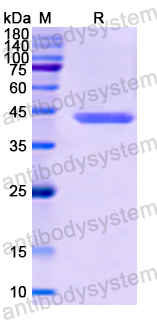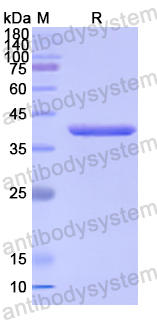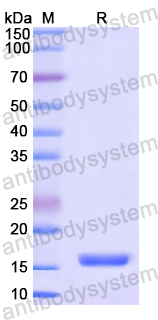Catalog No.
YHF41701
Expression system
E. coli
Species
Homo sapiens (Human)
Protein length
Ser2-Ser160
Predicted molecular weight
44.98 kDa
Nature
Recombinant
Endotoxin level
Please contact with the lab for this information.
Purity
>90% as determined by SDS-PAGE.
Accession
P61244
Applications
ELISA, Immunogen, SDS-PAGE, WB, Bioactivity testing in progress
Form
Lyophilized
Storage buffer
Lyophilized from a solution in PBS pH 7.4, 1mM EDTA, 4% Trehalose, 1% Mannitol.
Reconstitution
Reconstitute in sterile water for a stock solution.
Shipping
In general, proteins are provided as lyophilized powder/frozen liquid. They are shipped out with dry ice/blue ice unless customers require otherwise.
Stability and Storage
Use a manual defrost freezer and avoid repeated freeze thaw cycles. Store at 2 to 8°C for frequent use. Store at -20 to -80°C for twelve months from the date of receipt.
Alternative Names
Class D basic helix-loop-helix protein 4, Myc-associated factor X, MAX, Protein max, BHLHD4, bHLHd4
Early-Onset Sarcoma With Germline MAX Variant: Expanding the Spectrum in Hereditary Pheochromocytoma and Paraganglioma., PMID:40492017
Bilateral Pheochromocytoma with a Novel Pathogenic Variant in the MAX gene: A Case Report., PMID:40416485
One-Pot Total Synthesis of a Post-translationally Modified Max Transcription Factor Sheds Light on Ser-Phosphorylation and Lys-Acetylation Crosstalk in DNA Binding., PMID:40163800
Discovery of a Pyrazolopyridinone-Based MYC Inhibitor That Selectively Engages Intracellular c-MYC and Disrupts MYC-MAX Heterodimerization., PMID:40077826
Sulfinyl Aziridines as Stereoselective Covalent Destabilizing Degraders of the Oncogenic Transcription Factor MYC., PMID:40060528
Expanding the phenotype of multiple endocrine neoplasia type 5 (MEN5): Pituitary gigantism, myelolipoma and familial pheochromocytoma due to a germline pathogenic MAX variant., PMID:39934510
Clinicopathological and genomic analysis of pediatric pheochromocytoma and sympathetic paraganglioma., PMID:39894509
Characteristics of soybean (Glycine max) protein hydrolysate by bromelain and its effect on inflammation and kidney disorders in gentamicin-induced male Wistar rats., PMID:39877638
Transcriptional activation and coactivator binding by yeast Ino2 and human proto-oncoprotein c-Myc., PMID:39820713
Genotype and clinical phenotype characteristics of MAX germline mutation-associated pheochromocytoma/paraganglioma syndrome., PMID:39279998
Directly Suppressing MYC Function with Novel Alkynyl-Substituted Phenylpyrazole Derivatives that Induce Protein Degradation and Perturb MYC/MAX Interaction., PMID:38989847
[MAX germline mutation-associated pheochromocytoma-paraganglioma syndrome: multiple endocrine neoplasia type 5]., PMID:38937132
Antitumor Effect of Anti-c-Myc Aptamer-Based PROTAC for Degradation of the c-Myc Protein., PMID:38682443
FXR Agonism with Bile Acid Mimetic Reduces Pre-Clinical Triple-Negative Breast Cancer Burden., PMID:38611046
High-Throughput Antigen Microarray Identifies Longitudinal Prognostic Autoantibody for Chemoimmunotherapy in Advanced Non-Small Cell Lung Cancer., PMID:38513890
MAX controls meiotic entry in sexually undifferentiated germ cells., PMID:38433229
A recurrent de novo MAX p.Arg60Gln variant causes a syndromic overgrowth disorder through differential expression of c-Myc target genes., PMID:38141607
Structure-guided screening of protein-protein interaction for the identification of Myc-Max heterodimer complex modulators., PMID:38109131
NMR-identification of the interaction between BRCA1 and the intrinsically disordered monomer of the Myc-associated factor X., PMID:38037490
New tricks for an old pathway: emerging Notch-based biotechnologies and therapeutics., PMID:37891017
[High expression of Circ-PALLD in heart failure is transcriptionally regulated by the transcription factor GATA4]., PMID:37712274
Visualizing single-molecule conformational transition and binding dynamics of intrinsically disordered proteins., PMID:37626077
Sarcoma with MGA::NUTM1 fusion: a report of three cases and literature review., PMID:37442637
Cooperation between bHLH transcription factors and histones for DNA access., PMID:37407816
RUNX3 inactivates oncogenic MYC through disruption of MYC/MAX complex and subsequent recruitment of GSK3β-FBXW7 cascade., PMID:37400551
Effects of MYC Inhibitors on the Growth of Acute Leukaemia Cells., PMID:37351975
High Intrinsic Oncogenic Potential in the Myc-Box-Deficient Hydra Myc3 Protein., PMID:37174665
Validation of Myc-Associated Protein X (MAX) regulation in growth hormone secreting and nonfunctional pituitary adenoma., PMID:37104368
MAX transcriptionally enhances PD-L1 to inhibit CD8+ T cell-mediated killing of lung adenocarcinoma cells., PMID:36931054
MORC2 and MAX contributes to the expression of glycolytic enzymes, breast cancer cell proliferation and migration., PMID:36802305
Integrated analysis of mRNA-seq and miRNA-seq reveals the potential roles of Egr1, Rxra and Max in kidney stone disease., PMID:36484839
Targeting MYC with modular synthetic transcriptional repressors derived from bHLH DNA-binding domains., PMID:36302987
SARS-CoV-2 Nsp6 damages Drosophila heart and mouse cardiomyocytes through MGA/MAX complex-mediated increased glycolysis., PMID:36180527
A comparative analysis of anti-lipidemic potential of soybean (Glycine max) protein hydrolysates obtained from different ripening stages: Identification, and molecular interaction mechanisms of novel bioactive peptides., PMID:36179519
The Disordered MAX N-terminus Modulates DNA Binding of the Transcription Factor MYC:MAX., PMID:36174765
miR-22 Suppresses EMT by Mediating Metabolic Reprogramming in Colorectal Cancer through Targeting MYC-Associated Factor X., PMID:36061355
Inflammation-dependent activation of NCOA2 associates with p300 and c-MYC/Max heterodimer to transactivate RUNX2-AS1 and mediate RUNX2 downstream bone differentiation genes in the pathology of septic nonunion., PMID:35964415
Succinate dehydrogenase and MYC-associated factor X mutations in pituitary neuroendocrine tumours., PMID:35938916
Toward protein NMR at physiological concentrations by hyperpolarized water-Finding and mapping uncharted conformational spaces., PMID:35930648
Bilateral Pheochromocytoma with Germline MAX Variant without Family History., PMID:35645312
3JC48-3 (methyl 4'-methyl-5-(7-nitrobenzo[c][1,2,5]oxadiazol-4-yl)-[1,1'-biphenyl]-3-carboxylate): a novel MYC/MAX dimerization inhibitor reduces prostate cancer growth., PMID:35440696
Functional inhibition of c-Myc using novel inhibitors identified through "hot spot" targeting., PMID:35378126
MAX deficiency impairs human endometrial decidualization through down-regulating OSR2 in women with recurrent spontaneous abortion., PMID:35146559
Neuroprotective Gene Therapy by Overexpression of the Transcription Factor MAX in Rat Models of Glaucomatous Neurodegeneration., PMID:35103748
Repression of germline genes by PRC1.6 and SETDB1 in the early embryo precedes DNA methylation-mediated silencing., PMID:34857746
Altered expression of fragile X mental retardation-1 (FMR1) in the thymus in autoimmune myasthenia gravis., PMID:34789272
MXD1 is a Potential Prognostic Biomarker and Correlated With Specific Molecular Change and Tumor Microenvironment Feature in Esophageal Squamous Cell Carcinoma., PMID:34761715
The glucose-sensing transcription factor MLX balances metabolism and stress to suppress apoptosis and maintain spermatogenesis., PMID:34669700
Investigation of the variations in dissolved organic matter properties and complexations with two typical heavy metals under the influence of biodegradation: A survey of an entire lake., PMID:34597965
MAX mutant small-cell lung cancers exhibit impaired activities of MGA-dependent noncanonical polycomb repressive complex., PMID:34493659



